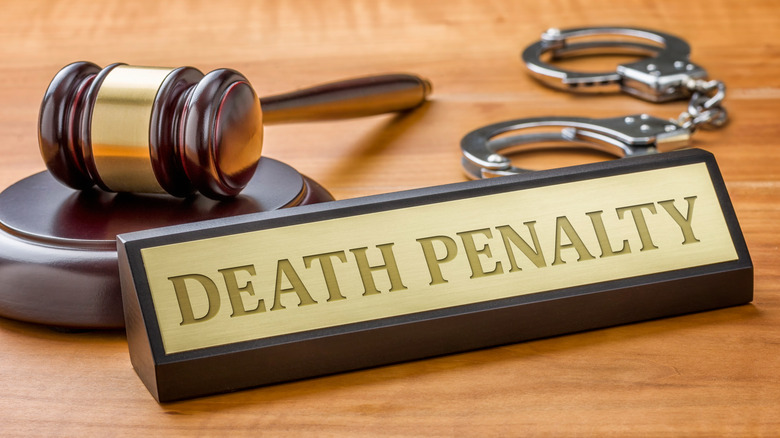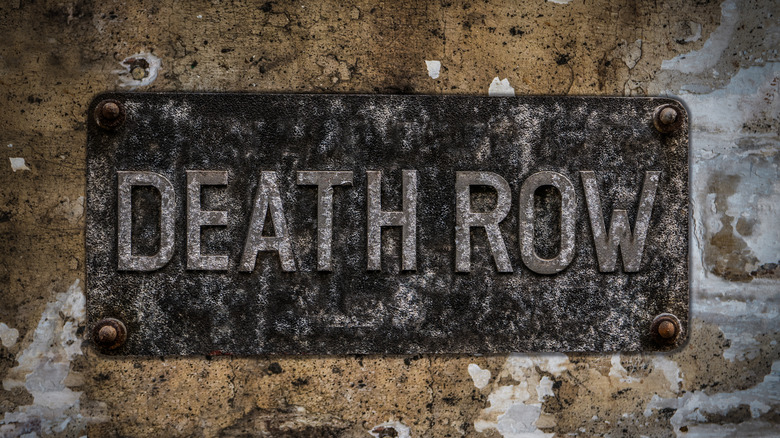Why Four States Still Allow For Execution By Firing Squad
The death penalty is the typical sentence for criminals who have committed the crime of murder, but there are some states that allow the death penalty for other crimes, such as aggravated kidnapping, treason, and aircraft hijacking. As of 2022, 27 states, as well as the U.S. military, still authorize the death penalty (via Death Penalty Information Center). Thousands of people have been executed in the United States since the 1600s, and the manner of execution has evolved throughout the years. Hanging, electrocution, lethal gas, and shooting are some of the ways criminals have been put to death.
Lethal injection is the most widely used method of carrying out the death penalty today. It was first utilized in December 1982, in the execution of Charles Brooks Jr. in Huntsville, Texas. Back then, only one drug was used — sodium pentothal — which at a high dosage can render a person unconscious in as quick as several seconds. At lower doses, it is used as a truth serum, as reported by History. Within the next several years, more states recognized lethal injection as the most humane way to execute a person. Presently, lethal injection is most commonly done by administering three drugs in succession — the first is to render the inmate unconscious, the second is to paralyze the muscles, and the third is to induce a cardiac arrest that leads to death, as noted by Human Rights Watch.
The difficulty of acquiring lethal injection drugs
There's an ongoing debate about how humane lethal injection really is, especially since there have been instances wherein the process was botched and inmates suffered as a result. As reported by the Washington Post, Supreme Court officials heavily debated the use of certain lethal injection drugs after botched executions. There was a shortage of the typical drugs used, and some states sought alternative drugs, which ended in disastrous executions that were akin to torture.
It has become increasingly difficult to procure drugs used for lethal injection, as pharmaceutical companies do not want to be associated with the practice, and some have openly announced their opposition to capital punishment. In 2019, as reported by Healthline, pharmaceutical giant Pfizer released a statement that read, "Pfizer makes its products to enhance and save the lives of the patients we serve. Consistent with these values, Pfizer strongly objects to the use of its products as lethal injection for capital punishment."
As a result of the difficulty of acquiring drugs, states have been forced to make use of other authorized methods of carrying out the death penalty, namely electrocution, lethal gas, hanging, and firing squad, per the Death Penalty Information Center.
States that employ the firing squad
The four states that still allow execution via firing squad are South Carolina, Mississippi, Oklahoma, and Utah. (via Death Penalty Information Center). In 2021, a new law was enacted in South Carolina that gives death row inmates the choice of getting executed by a firing squad or the electric chair if drugs for lethal injection cannot be procured. In Mississippi, corrections officials are given the choice of how death row inmates are executed (lethal injection, firing squad, electrocution, or nitrogen hypoxia). According to NPR, the firing squad was banned as a method of execution in Utah in 2004, but it was brought back in 2015 because of the difficulty of acquiring lethal injection drugs. Oklahoma has never used a firing squad for executions despite the method being allowed in the state.
The last person executed via firing squad in the United States was Ronnie Lee Gardner, who was sentenced to death for murdering a man as he attempted to escape from a courthouse. Although he was executed in 2010 in Utah when the firing squad wasn't employed as a method of execution in the state, it was allowed as he was sentenced in 1985 before the ban in 2004. Gardner was given a choice between lethal injection and a firing squad, and he chose the latter. In an interview with Deseret News, Gardner said he preferred the method because "it's so much easier ... and there's no mistakes."


